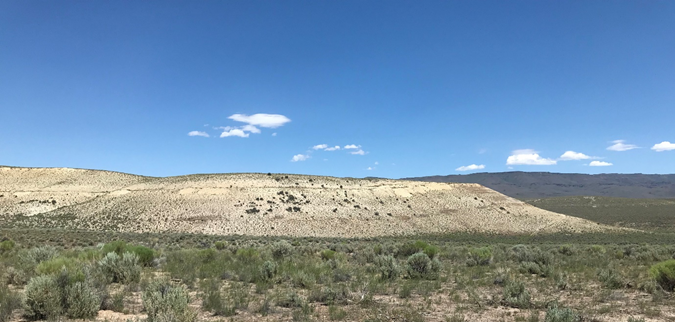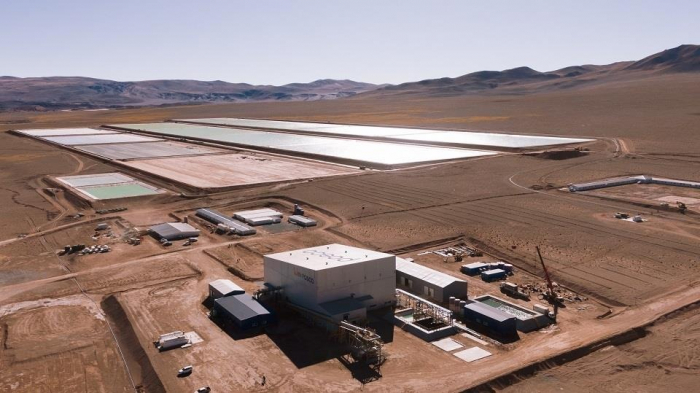Batteries
POSCO ties up with Aussie firm on US EV cell mineral project
The South Korean group plans to develop technology to extract lithium from clay at Jindalee’s McDermitt Project in Oregon
By Feb 14, 2023 (Gmt+09:00)
3
Min read
Most Read
LG Chem to sell water filter business to Glenwood PE for $692 million


Kyobo Life poised to buy Japan’s SBI Group-owned savings bank


KT&G eyes overseas M&A after rejecting activist fund's offer


StockX in merger talks with Naver’s online reseller Kream


Mirae Asset to be named Korea Post’s core real estate fund operator



South Korea’s POSCO Group has joined hands with an Australian company to work on an electric vehicle battery material project in the US as it aims to benefit from Washington’s tax credit to bolster its own EV sectors.
POSCO Holdings Inc., a holding company of cell material maker POSCO Chemical Co., signed a memorandum of understanding with Australia’s Jindalee Resources Ltd. to produce lithium, a material that makes up some 40% of EV battery production costs.
POSCO Holdings and Jindalee said they agreed on joint research designed to optimize the flowsheet for processing ore from McDermitt Lithium Project in Oregon, wholly owned by the Australian company, under the non-binding deal.
Jindalee will provide a large composite sample of lithium clay from McDermitt for testing at the Research Institute of Industrial Science & Technology (RIST), POSCO Holdings’ research facility, in South Korea. The company and the RIST plan to develop optimal lithium extraction process technology and review business feasibility.
POSCO Holdings advises that testing of the McDermitt ore will investigate three separate metallurgical processes. The test work is expected to take approximately six months at a cost of approximately 2 million Australian dollars ($1.4 million), which will be entirely funded by the South Korean conglomerate, according to Jindalee.
Both companies will jointly evaluate the commercialization of the project following the completion of the test work.
The deal came as global EV makers and battery producers are scrambling for stable procurement of cell materials from the US or its free trading partners as Washington took measures to support its own EV-related industries and keep China’s growth in these sectors in check.
According to the Inflation Reduction Act (IRA), the US government provides tax breaks of up to $7,500 per vehicle only to EVs equipped with batteries that contain 40% or more materials procured in the US or its free trading partners. The proportion is set to rise to 70% by 2027 as the government increases the requirement by 10 percentage points every year.
“This arrangement will allow Jindalee to further examine the potential of the McDermitt Lithium Project in Oregon, a very large and strategically important domestic source of lithium for the US battery industry,” said Jindalee Chairman Justin Mannolini in a statement.
LITHIUM EXTRACTION
POSCO Holdings, which has been developing technology to extract lithium from brine, ore and waste batteries with the RIST since 2010, is producing the mineral mainly based on materials from lithium mines and salt lakes.
The company procures lithium concentrate from Australian miner Pilbara Minerals Ltd. through a long-term supply deal, while producing its own from the Hombre Muerto Salt Lake in northwest Argentina, which it bought for $280 million in 2018.

POSCO Holdings aims to produce 300,000 tons of lithium a year, enough for 4.5 million EVs, by 2030 with 150,000 tons from mines, 120,000 tons from brine and 30,000 tons from waste batteries.
Lithium has yet to be commercially produced from clay and oil-field brines as the quality of the mineral extracted from those resources is lower than the material from mines and salt lakes.
But clay and oil-field brine could become new sources of lithium with improved technology and further exploration as large-scale reserves have recently been reported in North America and other regions, POSCO holdings said.
Write to Kyung-Min Kang at kkm1026@hankyung.com
Jongwoo Cheon edited this article.
More to Read
-
 BatteriesPOSCO to invest $4 bn in Argentina battery materials project
BatteriesPOSCO to invest $4 bn in Argentina battery materials projectMar 22, 2022 (Gmt+09:00)
2 Min read -
 SteelPOSCO to spend $830 mn to build lithium plant in Argentina
SteelPOSCO to spend $830 mn to build lithium plant in ArgentinaDec 16, 2021 (Gmt+09:00)
2 Min read -

Comment 0
LOG IN


